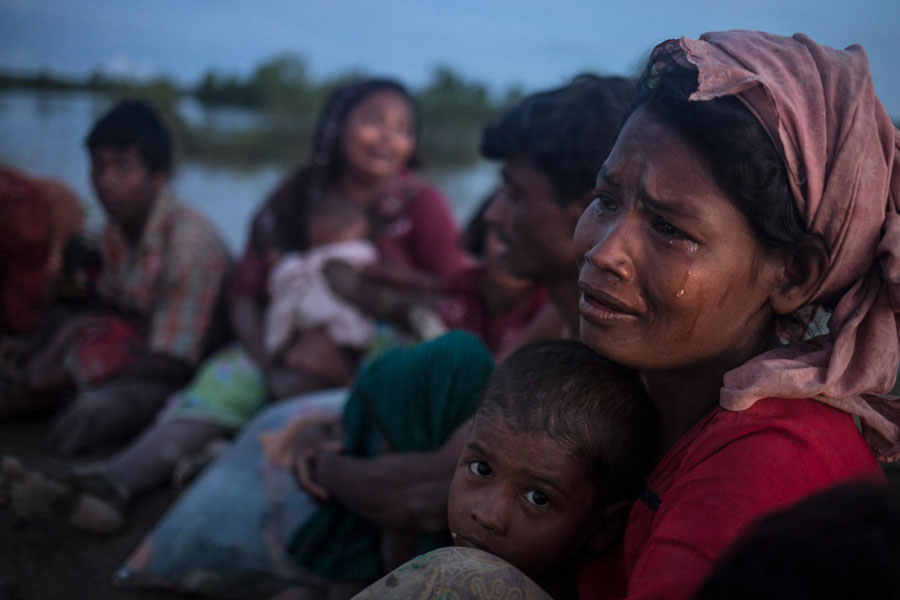
Published :
Updated :

Experts at a colloquium on Wednesday suggested both overt and covert initiatives to ensure successful repatriation of the Rohingya to their homeland in Myanmar.
They pointed to the current political scenario of Myanmar where the anti-military government forces are gaining ground day by day.
The experts said the Rohingya crisis was posing a serious security threat to Bangladesh and other neighbours of Myanmar.
The Centre for Peace Studies (CPS) of the South Asian Institute of Policy and Governance (SIPG) at North South University (NSU) hosted the event styled 'Current Crisis of Myanmar and Its Impact on Neighbouring Region'.
Kyaw Zaw, spokesperson for and adviser to the President of National Unity Government (NUG) of Myanmar, NSU Asst Prof Dr Raymond Kwun-Sun Lau, security analyst Brig Gen (retd) M Sakhawat Hossain, Dr Md Mahbubul Haque, faculty of Sultan Zainal Abidin University of Malaysia and former foreign secretary Md Shahidul Haque spoke.
Sk Tawfique M Haque, director of the SIPG and the CPS, moderated the discussion.
Mr Zaw said the genuine repatriation of the Rohingya could not be possible with the military regime in power in Myanmar.
On the NUG's stance, he said: "We pledge full individual and collective rights, including full citizenship for the members of the Rohingya community."
The NUG acknowledged violence and human rights violations by the army, including forced displacement of hundreds and thousands of the Rohingya, he added.
Promising immediate repatriation of the displaced people, Mr Zaw said genuine repatriation would not take place with this genocidal military junta in power.
"And our government is also committed to abolishing all the discriminatory laws, including the 1982 citizenship law," he said.
"What we do know is that the first we need to win. We need to topple this brutal military government and end military dictatorship to build a federal democracy."
According to Mr Zaw, the NUG is the most inclusive government in history as it has cabinet ministers from all ethnic groups, including the Rohingya.
About the NUG policy, he said, "I can assure you that there will be no more Balkanisation as we all are united not only against brutal military, but also we're all united in building a genuine federal democracy."
On the current civil war, the NUG spokesperson said the NUG fighters, known as the People's Democratic Force, have turned the tide against 'the criminal, brutal military because of their bravery, commitment and professionalism'.
"And as you may remember, almost everyone believed that Myanmar military is one of the strongest armed forces in the South-East Asia, they cannot be defeated by the people's movement. But now, everybody is saying that the military is collapsing."
"We have captured over 500 military bases across Myanmar and the 6 Major Generals and over 4000 troops have surrendered," added Mr Zaw.
Mr Shakhwat said as the ongoing civil war in Myanmar reportedly spread to the bordering areas, it posed security threats to the neighbouring countries of Myanmar like Bangladesh and India.
Referring to media reports, he said the situation would be more complex if the Rohingya joined hands with the Arakan Army.
He felt that efforts, both 'over the table and under the table', were required for a successful solution to the Rohingya crisis.
Ex-secretary Huq focused on India's approach to the Myanmar crisis, saying that Myanmar was very important to India for its 'Act East' and 'Neighbours First' policy.
"In fact, Myanmar provides India the land connection with the ASEAN and this is the only ASEAN country, which has a border with India."
Mr Huq said India's position towards the military regime had changed in recent years as the country was giving more priority to its national interest than the type of government in Myanmar.
India has a lot of infrastructure projects in Myanmar and that is why the Modi government prefers to have good ties with the incumbent military government.
"They (India) decided that national interests and security concerns come on the top. They went ahead and engaged deeply with the military," observed Mr Huq.
Meanwhile, Prof Lau spoke about China's role in the current situation, uttering China's high economic interests in Myanmar.
"China is constructing deep sea port under China Myanmar Economic Corridor project to have direct access to the Indian Ocean."
Under the Belt and Road Initiative, said Prof Lau, China has a major stake in infrastructure projects, including railroads, highways, oil-and-gas pipelines, a deep-sea port and China-Myanmar economic corridor.
"The bottom line is Beijing will have to make efforts to play a role as a mediator in order to prevent this conflicting situation from getting out of control."
Dr Mahbub said as ASEAN countries were divided in its approach to Myanmar, it was very difficult for them to act as a successful mediator to resolve the crisis.
mirmostafiz@yahoo.com


 For all latest news, follow The Financial Express Google News channel.
For all latest news, follow The Financial Express Google News channel.